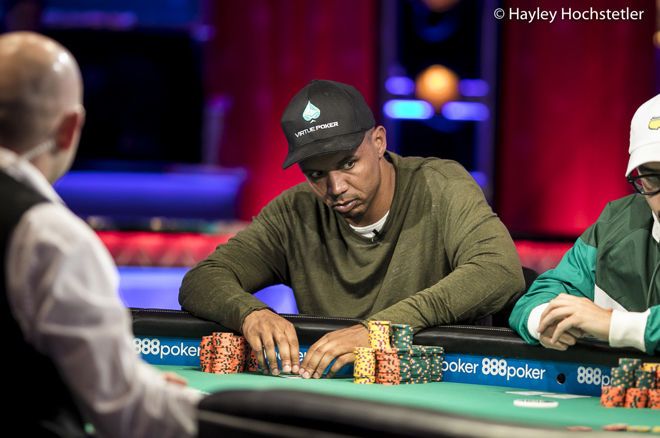09 Dec
Nov 03, 2016 Ivey vs Crockfords game over? Three judges of the Court of Appeal considered all the facts of the case, as they were presented to them, and confirmed the verdict of the High Court. The decision means that Ivey won’t be seeing any of his $9.6 million in baccarat winnings that were withheld by the casino. Poker Hall of Famer Phil Ivey took a bad beat in court yesterday, when his lawsuit against Genting Casinos UK was dismissed by the UK Supreme Court. He will thus never be able to get his hands on the £7.8 million he won while playing Punto Banco at Crockfords Casino.
Phil Ivey is no stranger to the concept given his well-documented years of gambling at the highest stakes, but his recent Double or Nothing challenge against NBA legend Allen Iverson was far removed from his casino adventures!
Ivey’s poker and Iverson’s hoop exploits were swapped for beer pong, building houses of cards and racing pedal trikes as the Hall of Famers in their respective games launched a new promotion for the Chinese mobile cardroom, Poker King.
Ivey Vs Casino Poker
Ivey needs no introduction to poker fans of course, the 43-year old Californian also a long-time fan of Macau’s biggest games as well as other Asian-based cardrooms – so seeing him represent PK is hardly a surprise.
Iverson, for those who don’t follow basketball, is as legendary to NBA as Ivey is to the WSOP, nicknamed A.I. or The Answer, and playing 14 years at the very pinnacle of the sport.
Both men are of course hugely popular, and appear to be having great fun in the WePoker-produced video, Iverson holing a crazy golf putt and Ivey providing the ‘Double or Nothing’ catchphrase.
The duelling duo then battle it out over a series of games, including swords/scissors/paper, with Ivey surprisingly sinking a huge three-pointer from the jacuzzi while Iverson misses!
A spot of leaf-blower cheating at the toy yacht races sees Ivey take the lead, with Iverson pulling him back with a masterful, Madison Square Gardens-inspired house of cards.
The finale, of course, is a poker showdown, with Iverson all-in and reaching for the chips with his straight…until Ivey points out: “You can touch them but you can’t take them!”, before revealing his winning full house.
The Poker King cardroom, PK8.com, was obviously inspired by PokerStars #GameOn promo, featuring fastest man in the world, Usain Bolt, and comedy actor, Kevin Hart.
That saw the two poker-loving celebrities engaged in their own series of challenges, Bolt stating he was ‘All-in for PokerStars’ to announce his celebrity endorsement.
Although Ivey tends to shy away from social media, his fans in the poker world will be lapping his latest appearance up, while Iverson’s monster following of millions will undoubtedly be a target for the cardroom’s marketing team.
- Want poker news as it breaks? Join the Poker News and Gossip Telegram channel!
14 Nov 2017
Angelina Nicolaou of 1 Pump Court comments on the implications of the case of Ivey v Genting Casinos [2017] UKSC 27 for criminal cases dealing with the definition of dishonesty.

Angelina is currently undertaking pupillage in our Crime and Immigration teams. She previously worked in solicitors firms handling criminal cases and civil actions against the police. She will be available to accept instructions from 12 April 2018.
Background
The Claimant, Mr Ivey is a professional gambler. In August 2012 he won approximately £7.7million in a card game called Punto Banco at Crockfords Casino. Mr Ivey won this game due to deploying a highly specialist technique called ‘edge-sorting’. The casino refused to pay Mr Ivey his winnings, relying on the fact that he had cheated by using the edge-sorting technique. Mr Ivey sued the casino for his winnings, on the basis that he considered edge-sorting to be a legitimate technique deployed in the game in order to gain an advantage.
In order to determine whether Mr Ivey had in fact been cheating, it was necessary to consider whether his behaviour had been ‘dishonest’. The Supreme Court therefore turned its mind to this exercise, having heard submissions made on Mr Ivey’s behalf that the second limb of the test laid out in the case of Ghosh had not been met.
What was the test under Ghosh?
The case of R v Ghosh [1982] QB 1053 concerned a surgeon who was convicted for receiving payments for work carried out by others. The ‘Ghosh test’ was two-staged: The first consideration is whether ordinary and honest people would regard the behaviour as dishonest. The second consideration is whether the defendant knew that ordinary honest people would regard it as dishonest.
Juries are not ordinarily directed as to the definition of dishonesty generally, other than to be reminded that the word bears its original meaning. Before Ivey, if it was the case that a defendant put forward that they had believed that their conduct would be considered honest, a specific Ghosh direction would have been made. The jury would have been asked to consider the following:
Have the prosecution proved D was acting dishonestly by the ordinary standards of reasonable and honest people?
If the prosecution have proved D’s act was dishonest by those standards, did D realise he was acting dishonestly by the ordinary standards of reasonable and honest people?
If the prosecution prove the defendant realised he was acting dishonestly, by the ordinary standards of reasonable and honest people, it is no defence for a defendant to say he was acting honestly by his own standards.
Ivey Vs Casino Stock

Ivey V Genting Casinos (uk) Ltd
The Judgment

The Supreme Court in Ivey held that the Ghosh test has ‘serious problems’ and does not correctly represent the law.
At paragraph 74 of Lord Hughes’ judgment, it was held that the test to be applied is as set out by Lord Nicholls in Royal Brunei Airlines Sdn Bhd v Tan [1995] 2 AC 378 and by Lord Hoffmann in Barlow Clowes International Ltd v Eurotrust International Ltd [2006] 1 WLR 1476:
“Although a dishonest state of mind is a subjective mental state, the standard by which the law determines whether it is dishonest is objective. If by ordinary standards a defendant’s mental state would be characterised as dishonest, it is irrelevant that the defendant judges by different standards. The Court of Appeal held this to be a correct state of the law and their Lordships agree” [pp1479-80].
As such, it was held that the Ghosh direction should no longer be given. The reason for this is that the Ghosh test involves less criminal responsibility for those whose standards do not conform to society’s expectation. This runs counter to the purpose of the criminal law, which should be to set acceptable standards of behaviour.
It was accepted that Mr Ivey was genuinely convinced that what he did was not cheating. The Supreme Court held, however, that “the question which matters is not whether Mr Ivey thought of it as cheating but whether in fact and in law it was”.
It was therefore held that the test should be whether the conduct would be considered dishonest by reference to the standards of ordinary honest people. The subjective element has been removed. However it was indicated that the objective assessment of dishonesty naturally involves certain considerations of what the Defendant knew when committing the act. The Court held that if a person genuinely believes that public transport is free, there is nothing objectively dishonest about him not paying for the bus. Ordinary honest people would not view his conduct as dishonest.
Implications for the criminal law
Ivey v Genting Casinos is a civil law matter. Mr Ivey was suing the casino on the basis of them not providing him with his winnings. The burden of proof was on Mr Ivey, who brought his case, and the standard of proof was on the balance of probabilities.
However, the implications of this judgment reach far further than just civil cases in light of the Supreme Court’s comment that that the Ghosh direction, (which was routinely used in criminal cases when assessing dishonesty) is now redundant. The Court went as far as to say: “there can be no logical or principled basis for the meaning of dishonesty to differ according to whether it arises in a civil action or a criminal prosecution”.
Interestingly, at paragraph 59, the court focussed on some defences run by defendants in business crime cases: “there is no reason why the law should excuse those who make a mistake about what contemporary standards of honesty are, whether in the context of insurance claims, high finance, market manipulation or tax evasion”.
Defence practitioners will now have to advise clients, (many of whom may have already served defence statements on the basis of the law as it stood under R v Ghosh), that the lens through which their conduct will be judged, is now purely an objective one. It is no longer the case that a defendant can rely on the fact that they were unaware that their actions were and would be regarded as dishonest. Of course, the Prosecution still have to prove their case according to the criminal standard of proof, being ‘beyond reasonable doubt’, however the test for dishonesty is now a much easier one for the Prosecution to meet.
Defendants who have already entered a plea of not guilty at the start of proceedings on the basis of earlier advice that they had a defence under the Ghosh test, may have to consider entering a guilty plea before trial. It is likely that in light of the circumstances a court could be persuaded to award full credit for such a guilty plea, keeping in mind the exceptions found in the Sentencing Council’s recently published Guidance on the Reduction in Sentence for Guilty Pleas. Where the court is satisfied that there were particular circumstances which made it unreasonable to expect the defendant to indicate a guilty plea sooner than was done, a reduction of one third should still be made.
The second limb of the Ghosh test was not intended, and nor did it work as a “get out of jail free card” for those who brazenly seek to rely on a moral code of their own, which is completely out of step with what is generally thought to be honest and acceptable conduct. It was, however, the case that a defendant could say that they did not know that their actions would be considered so out of step. Whether such an assertion would then be believed or not, was entirely a matter for the jury. The removal of this consideration now denies the jury the opportunity to engage more widely with the question of the Defendant’s mind-set, creating a much more limited remit in which to assess dishonesty.

To access the case of Ivey v Genting Casinos please visit: http://www.bailii.org/uk/cases/UKSC/2017/67.html
 Back to News
Back to News